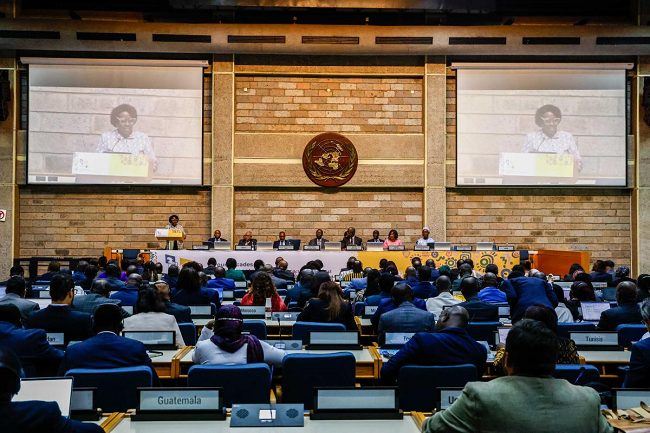In a historic gathering marking the 40th anniversary of the African Ministerial Conference on the Environment (AMCEN), African Heads of State, Ministers of Environment, and global partners convened in Nairobi under the auspices of Libya’s presidency to adopt a High-Level Political Declaration (HLPD). This milestone declaration reaffirms Africa’s collective resolve to tackle escalating environmental challenges ranging from climate change and biodiversity loss to pollution and land degradation while celebrating four decades of continental leadership in environmental governance.

The declaration set the tone for a transformative future rooted in sustainability, resilience, and inclusive development. More than 1,500 delegates, including environment ministers from all of Africa’s 54 countries, civil society, private sector actors, youth, and development partners participated in the week-long conference.
“The African Ministerial Conference on the Environment must remain at the forefront of shaping the ‘Africa We Want’ through bold, visionary, and action-oriented leadership, Kenya is proud to walk this journey with you, advocating for environmental justice that recognises our unique development needs and circumstances. Let us not only speak with one voice but act with one resolve. The next forty years must be about delivery, not deliberation,” the ministers declared.
President William Ruto had earlier in the week, on Wednesday, made an unscheduled visit to meet with AMCEN delegates, reaffirming Kenya’s commitment to environmental leadership and calling for greater African unity in tackling climate change
Ministers adopted the Tripoli Declaration on Environmental Action in Africa, a bold and forward-looking roadmap outlining key priorities for 2025–2027. The Declaration calls for urgent regional action on drought, biodiversity loss, plastic and chemical pollution, as well as integration of circular and blue economy approaches anchored in science, cooperation, and environmental justice. The final text of the Tripoli Declaration will be ready in a month.
Moses Vilakati, Commissioner for Agriculture, Rural Development, Blue Economy and Sustainable Environment of the African Union Commission (AUC), reflected on the enduring legacy of AMCEN:
“As we celebrate 40 years of AMCEN, we acknowledge its role in helping Africa speak with one voice and shape policies. Over the years, AMCEN has reinforced our shared commitment to resilience and sustainable development. But as we celebrate, we must also look ahead. The road is long, and we must face the realities and challenges we know too well – rapid population growth, the weaponisation of natural resources, and climate change. We must bridge coordination gaps between AMCEN and other bodies. AMCEN’s journey is far from complete; in fact, it is just beginning.”
The High-Level Political Declaration reaffirmed AMCEN’s role as the principal forum for Africa’s environmental agenda; committed to stable and predictable financing for AMCEN’s Trust Fund and UNEP’s Environment Fund and called for a regional multi-stakeholder forum on chemicals and waste management. It also pledged to combat climate change through national and regional action plans; called for a legally binding protocol on drought under the UNCCD and; reaffirmed rejection of solar geoengineering.
The Ministers also adopted the Africa Ocean Governance Strategy and called for national blue economy strategies; established an African Groups of Negotiators on Oceans and Wetlands; urged ratification of the BBNJ Agreement and extended the Africa Decade of Seas and Oceans (2026–2035) and reaffirmed commitment to biodiversity conservation and implementation of the Kunming-Montreal Framework.
The ministers welcomed the creation of two more Africa Group of Negotiators on oceans and wetlands. Ministers also supported Nairobi as host of the Intergovernmental Science-Policy Panel on Chemicals, Waste and Pollution, strengthening Africa’s visibility in global environmental governance. The Declaration endorsed convening the next AMCEN as a joint session with African Finance Ministers, linking environmental imperatives with economic planning and budgeting.
Outgoing AMCEN President, Dr. Fitsum Assefa Adela, Minister of Planning and Development of Ethiopia, emphasised the need for AMCEN to evolve from dialogue to delivery: “This milestone marks not just the end of a chapter, but the beginning of a more ambitious phase. AMCEN must now become the platform for transformative action, not just declarations.”
Incoming AMCEN President, Dr. Ibrahim A. Munir, Minister of Environment of the State of Libya, pledged to uphold and accelerate AMCEN’s implementation agenda: “Libya is honoured to host this 20th session and assume AMCEN’s presidency at such a critical moment. We must now move from commitments to concrete delivery across all sectors and regions.”
Elizabeth Maruma Mrema, Deputy Executive Director of the United Nations Environment Programme (UNEP), lauded AMCEN’s enduring role in shaping Africa’s environmental destiny: “UNEP stands ready to provide technical and policy support to help turn these important conversations into actions that deliver impact where it is most needed. That’s why the theme of UNEA-7, to be held here in Nairobi in December, is “Advancing sustainable solutions for a resilient planet.”
From Reflection to Action
The session was preceded by a Regional Consultative Meeting of Major Groups and Stakeholders from July 10 to 13. The voices of civil society, Indigenous Peoples, women, youth, and academia were reflected in the declaration, which emphasised policy coherence, environmental data systems, and integrated planning between environment and finance ministries.
David Munene, Regional Facilitator of the Africa Major Groups and Stakeholders, urged ministers to maintain momentum beyond Nairobi:
“Beyond today, AMCEN must be bold in achieving its environmental targets, strengthening the link between coordination and implementation in Africa.” He further urged, “AMCEN to elevate the role of MGS Africa, civil society and academia in a youth and gender-inclusive manner.”
Africa Major Groups and Stakeholders, called for urgent halting and reversing biodiversity loss and restoration, a legally binding instrument covering the full life cycle of plastics, mercury pollution elimination, an ambitious Global Goal on Adaptation with clear indicators and requisite means of implementation, and meaningful stakeholder engagement.
The newly launched AMCEN@40 Anniversary Report was unveiled to honour the body’s legacy, which includes the creation of the Bamako Convention and Africa’s collective voice in global negotiations, including the Paris Agreement, UNCBD, and future COPs.
With a renewed sense of purpose, strong political backing, and united action, AMCEN enters its fifth decade poised to support Africa’s just, green, and resilient future.
